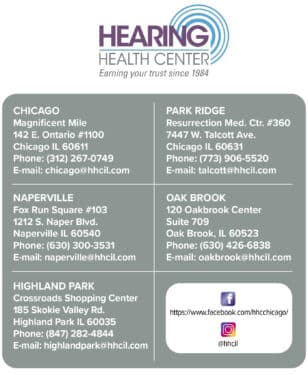Most people don’t connect their hearing ability with falling. But what you hear — and don’t hear — directly affects your balance.
Research shows that even a small decrease in hearing triples your risk of falling, and the worse your hearing gets, the more likely you are to fall.
So how are the two connected, and why is your hearing so important to your balance?
First, both our sense of balance and our sense of hearing are contained in the inner ear. They share the same nerve pathway to the brain.
Both hearing and balance start to decline in our 40s. More than one-third of Americans over age 40 failed a simple balance test, and every other person over age 50 has a significant hearing problem.
Reasons hearing loss increases your risk of falling
- Stable sounds: Sounds in the environment that help orient us. When you don’t have good awareness of your overall environment, you’re more likely to trip and fall.
- Cognitive overload: You hear with your brain, not your ears. Your ears are just an appendage to collect sound and send it to your brain. Your brain that processes, interprets, and makes sense of the sounds it receives. When you don’t hear well, it stresses the brain. The brain has to borrow resources used for other functions, like memory storage and maintaining your balance and gait.
- Mood: Decreased hearing ability is exhausting. Your brain is working so hard just to listen and try to understand, it makes us tired. When you’re tired, you’re not paying attention and are more likely to fall. Hearing loss increases depression and isolation. Both are directly linked to more falls, and falls make us more depressed. It’s a bad cycle.
Do hearing aids prevent falls?
In short, yes. Recent studies at the University of Colorado medical campus and University of Michigan showed significantly reduced risk of falling in adults with hearing aids. You are more aware of the stable sounds in your environment. When people with hearing loss hear stable background sounds, their posture improves. There is less cognitive overload on your brain so you can pay more attention to your balance. You are less tired, less depressed, and more social.
How to prevent falls
- Don’t take your hearing ability for granted. It’s not even included in your annual physical. Most people haven’t had their hearing tested since grade school. Everyone over age 50 should get a baseline hearing checkup. If you’re not hearing as well as you should, treat it early, as soon as possible.
- Walk and do resistance exercises to strengthen muscles. If you do fall, your bones and muscles are stronger and you’re less likely to break a bone.
- Get your vision Bifocals and tinted lenses are less appropriate as we get older. You might need to change your prescription or lenses.
- Fall-proof your home. Make sure your stairs are well lit and that the carpeting and railings are secure. Install grab bars near the toilet and bath or shower.
Medications can also increase your fall risk, especially if you’re taking multiple in combination. Blood pressure medications can cause blood pressure to get too low when you stand up from a lying or sitting position. It can make you light-headed and feeling faint.
Medications that suppress the central nervous system reduce alertness and cause slower reactions and movements. These include anti-anxiety drugs (Valium, Ativan), antihistamines, prescription sleep medications, and narcotics.
Medications for dizziness (Meclizine, Bonine, Antivert, Dramamine) act as a band-aid solution. They temporarily alleviate symptoms but don’t solve the root cause of the dizziness.
Hearing loss greatly compounds these additional fall risk factors. Do what you can for your hearing today to lessen the risk.












